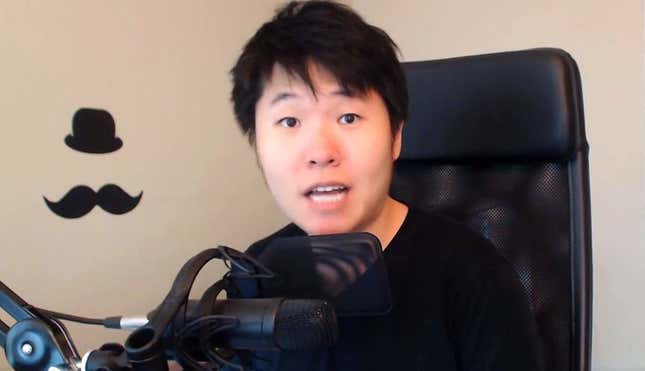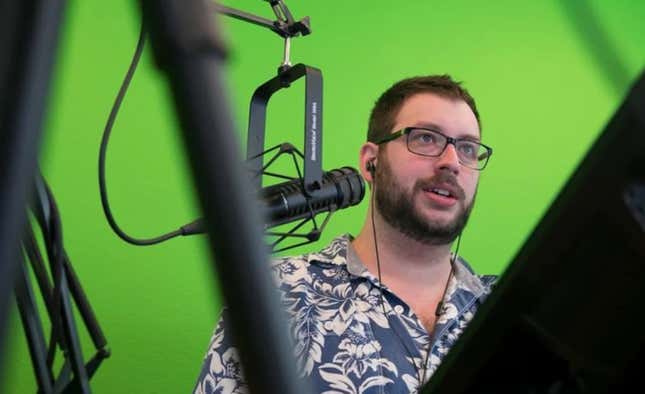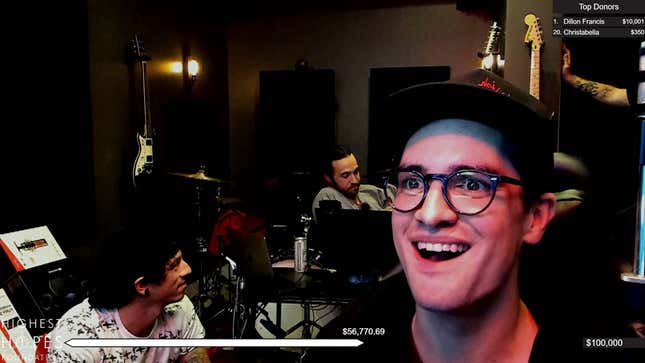
Early last year, then-Twitch streamer Jeremy “Disguised Toast” Wang received an email from a fan who’d donated $200 to him in 2018. “Hey, I donated money to you a year ago,” read the email according to Wang, who spoke to Kotaku over the phone. “I’m having hard times right now. Do you think you could return that donation?” Wang did so without batting an eyelash, only for the fan to reply that they’d donate it again “when I make more money.” This, ultimately, caused Wang to disable donations altogether. He didn’t want that kind of situation to happen again.
On Twitch and other streaming platforms like YouTube, Facebook, and Mixer, streamers make money from a variety of sources: advertisements that run before and during streams, subscriptions that grant fans perks like special emotes and Discord access, and lucrative brand deals. Many streamers also offer viewers the option to donate money whenever they please, generally as a show of support, or perhaps to help the streamer upgrade their PC, microphone, or what have you. Some top streamers, like Ben “Dr Lupo” Lupo regularly run donation drives for charity. Donation functionality is built into Twitch by way of a “cheering” system that allows users to encourage streamers with a proprietary currency called “bits,” though many streamers collect direct donations through services like PayPal instead.
For smaller streamers, who make up the vast majority of channels on Twitch, donations make a lot of sense. Their income is by no means consistent, and a few spare dollars can go a long way toward improving their setups or helping them cut the cord from their day job and go full time. Larger streamers, on the other hand, are often (though not always) making ample money from subscriptions, deals, and ads. A good deal alone can bring a streamer tens or hundreds of thousands of dollars. A donation, then, is a drop in a bucket—sometimes a bucket that’s bobbing lazily in a vast ocean full of other buckets.
As a result of these factors, Wang wound up disabling donations altogether. He told Kotaku that he understands fans kicking in a couple bucks here and there, but “I also see people donate to millionaire streamers, saying, like, ‘Hey man, this is all I can give you this month until my check comes in.’ And the streamer is just like ‘Yeah, thanks. Appreciate it.’” That didn’t sit right with him: “These are millionaires taking money from people who probably aren’t millionaires.”
Many other big streamers keep donation buttons or PayPal links in their streams. Some have acknowledged the inherent inequality of this arrangement. While chiding a fan who spammed chat after donating in October of last year, popular League of Legends streamer Tyler “Tyler1” Steinkamp derogatorily told the fan that they “donated to somebody who makes more than your parents combined.” More recently, he made fun of someone for donating $100. “Thank you so much for that $100,” he said during a stream last week. “You are a goddamn dipshit, though. Imagine giving a streamer money. You have problems in real life. You should get those sorted, then come back to the stream.”
But even for bigger streamers, keeping some form of the donation option around makes sense. Streaming is precarious work no matter how you slice it. Your game of choice could go out of vogue at the drop of a hat, or you might wind up on the brink of burnout, forced to face the idea that, if you take a break, a portion of your audience may walk out the door and never come back. Even big streamers want to squirrel away money, because their time in the spotlight probably won’t last forever.
In exchange for donations, streamers usually shout out donors, with some turning up the full-throated theatrics to 11 when viewers drop especially large sums of money. Sometimes, streamers allow viewers to send text-to-speech messages along with their donations. This means viewers can, for a handful of seconds, become part of their favorite stream. They’ve only got to stuff a few bucks in the tip jar. These privileges, it turns out, make for powerful incentives. A fan named Alex Flores told Kotaku in an email that he’s donated “$5-6k total over a four year period” to Cory “King Gothalion” Michael, a streamer who amassed over one million followers on Twitch before moving to Mixer toward the end of last year.
“I initially started donating/tipping/cheering as a way of thanking him for the quality of his entertainment,” said Flores. “It eventually turned into this weird habitual thing; the whole [ritual of] seeing your name in lights and a streamer acknowledging your presence made me feel good. I started giving money to other streamers who were considerably smaller than Gothalion for the same reasons.”
Flores kept at it, especially in one particular case with a streamer he declined to name, because it allowed him to gain community notoriety and forge what felt like valuable friendships. He even became a chat moderator for the aforementioned un-mentioned streamer, which “in a way amplified my compulsive donations.” In the end, he said he wound up donating somewhere in the neighborhood of $10,000 to various streamers. Recently, he decided to curb his spending because he began to feel like his relationships with streamers were “disingenuous and conditional on my continuous monetary support.”

“If a few weeks had gone by without a donation, it would feel like I would get ignored in chat,” he said. “I guess in the end, donating and hearing the broadcaster get super excited/shouting out your name and all of their [Open Broadcaster Software] effects going off didn’t mean anything anymore.”
Flores’ case is an extreme one. Many other viewers toss the odd coin in streamers’ hats simply to show appreciation. Wealth disparity does not factor into their calculations.
“It doesn’t matter how much money a streamer has,” said a Twitch streamer and viewer named Seluhir on Twitter. “If they’re doing something to make my life better (entertainment, advice, community, etc), then I have no problem donating, subscribing, or otherwise. I don’t stop to think ‘Ya know, this guy or girl might be richer than me.’”
“I compare streaming and donating to streams as supporting a local business,” a fan named Christina Lopez told Kotaku in an email. “Sure, they might have a small team now because they’ve exploded in size, but the core of the stream contains the reason why you started supporting them in the first place.”
“I have sent money because someone had been making me laugh on YouTube or whatever, for years,” a fan named Pierre Oliver told Kotaku on Twitter. “For the money disparity, I feel it’s the same as going to watch a dummy movie to be entertained. I like that it’s not mandatory, too.”
The movie comparison is, in some ways, an apt one. After all, movie studios utilize labor to create films, and the people who create those movies deserve money in exchange (the overpaid executives involved, perhaps less so). Online, we’ve become conditioned to expect entertainment for free. But streaming, like video-making, writing, and art, is a form of labor, and when streamers first start out on Twitch, they’re essentially giving that labor away for free. That’s a pretty raw deal. Big streamers, however, rarely have this problem, and they still make some money, albeit not as much, even when viewers tune in without dropping a dime. It is, then, a different arrangement, but the added element of choice makes spending money feel more significant, more personal. It’s a decision, a gesture of truly voluntary appreciation, and most of the fans I spoke to reserved it for a select few streamers who they feel regularly enrich their lives.
A fan named Joshua Caleb, who describes himself as working a “pretty dead-end part-time-ish job making a bit over minimum wage with lots of debt,” decided to donate to one of his favorite streamers, Barry “BarryIsStreaming” Kramer, at the end of a “very stressful year.”
“I donated $20 to Barry because I’d received a surprise $100 for Christmas, and since I have several friends who are in similar or worse situations as me, I decided to give out $20 to each of them and also to Barry since I’d been enjoying his content so much,” Caleb told Kotaku in an email. “He’s not really a ‘rage gamer’ or one of those ‘high-octane streamers’ who sound like they’re running on 16 cans of Red Bull. His streams have helped me to kind of relax and zone-out when I’m dealing with a lot of anxiety and depression both politically and personally.”
For some, it’s even more personal than that. A fan named Benjamin Gresik told Kotaku that he regularly donates to Destiny streamer Stefan “Datto” Jonke, who has nearly half a million followers and bought a house not too long ago. However, Gresik said that Jonke has expressed fear over what happens once Destiny dies out, and it’s a very specific form of fear he can identify with.
“I donate sort of out of pity for his level of anxiety,” Gresik said in an email, noting that Jonke is the same age as him and that he, too, fears the future. “When the game is doing well, he does better. If the game ever flames out, he doesn’t really have a path to migrate to another game or maintain the same level of success. It’s possible he could lose all of his subscribers due to attrition and go back to just getting by. That sounds like the kind of thing that would produce a high level of anxiety and dread in a person, and I think ‘I like whatever he makes, so I’ll support him with my five bucks even though he owns his own home and I might never.’”
Fans Kotaku spoke to were split on whether or not big streamers should take a page from Jeremy “Disguised Toast” Wang’s book and change their approach to donations.
Lopez appreciates streamers who let fans know that they’re not in dire straits and they don’t need donations, but she’s good with the current state of things overall. “I feel like the current system is healthy,” she said. “In the streams I watch, I don’t feel like there’s huge pressure to donate. Some streamers like Damien Haas even go out of their way to remind viewers that they don’t have to donate to talk to them. There are also streamers like Brendon Urie from Panic! At The Disco that have donations to their channels go right to charity.”

Gresik believes some streamers can afford to turn off donations, but due to the precarity that characterizes streaming, it’s not as simple of a flick of the switch as you might think. “I think turning off donations would make sense for some of those people (in kind of the top 1% or even top 0.25%), but for pretty much everyone else, I wonder if they can afford the luxury of not capitalizing on every moment of exposure they get right now,” he said, pointing to streamers like Tyler “Ninja” Blevins, Ben “Dr Lupo” Lupo, and Cory “King Gothalion” Michael” as “institutions” who he believes are in that upper echelon of streamers. “Streaming is such a weird thing, because your audience can just evaporate because of things that are beyond your control, and I wouldn’t fault mid-tier streamers who are technically doing fine for trying to maximize what people give them now while things are good.”
Still, there’s a dissonance that Caleb can’t help but feel in the act of donating to streamers who are, in all likelihood, significantly wealthier than most viewers. “Donating a precious chuck of your meager savings to a giant streamer who’s making money hand over fist through so many different partnerships and revenue streams does feel very ‘late stage capitalism,’” he said. “When a streamer reaches a certain size and income, they just have money and will have money for as long as they live, regardless of how many fans give them their hard-earned money. I actually prefer seeing the inverse: wealthy fans throwing not-insignificant chunks of money to small-to-medium size streamers they’re fans of. They enjoy the content, and they have plenty of money to spare.”
As for Wang, he feels like he made the right call in deciding to disable donations last year. When he announced it on Twitter, he decided to play up his online persona to bring levity to the situation. There was, however, a ring of truth to his words.
“On Twitter, I was kinda half-jokingly arrogant about it, like ‘Hey, I’m rich. I don’t need your money,’ and [people were like] ‘Oh, haha, that’s Toast,’” he told Kotaku. He went on to say, though, that his YouTube is doing well, he’s making money from sponsorships, and even if he one day retires from streaming, he’s confident in his ability to make money elsewhere. As a result, he doesn’t want viewers to ever feel like they “need” to donate or subscribe to him: “But it’s half-true,” he said in reference to his jokey framing of his rationale. “I don’t need the money. I’m pretty comfortable.”